News
Stack Overflow Dev Survey: TypeScript Surges, Leaving Python Behind
Microsoft's embrace of open source is paying off, says Stack Overflow in its new developer survey, as TypeScript has vaulted into second place (behind Rust) as the "most loved" programming language, pulling away from Python, with which it tied in last year's survey.
Stack Overflow is one of the most influential organizations in the developer community, serving as the go-to source for programming questions and advice. For the 10th year it just yesterday (May 27) published results of its huge developer survey that polls some 65,000 developers to gauge their feelings about programming language and tool popularity, among a bevy of other things ranging from education and salaries to mental health and much more.
One category is "most loved" language, in which the survey measures the percentage of respondents who are developing with a language and have expressed interest in continuing to develop with it. Last year, dev favorite Rust was also No. 1, with Python and TypeScript tied at No. 2. This year, TypeScript clearly established itself in second place.
"In 2020, TypeScript has surged in popularity, leaving Python in third place," Stack Overflow said in an announcement post.
"TypeScript's surge in popularity highlights Microsoft's change of direction and embrace of the open source movement. As front end web and Node.JS codebases grow in size and complexity, adopting TypeScript's static typing gives developers increased confidence in their code's correctness. TypeScript's ability to be adopted incrementally means developers can dip their toes in, gaining immediate benefits, without having to undertake a risky porting project. As a final sweetener, TypeScript polyfills many ECMAScript changes (like arrow functions, async, and classes) before they're widely available in browsers. We've been persuaded ourselves, as more and more of Stack Overflow's JavaScript is actually transpiled TypeScript."
Microsoft's metamorphosis into an open source champion has paid off well in many other areas as well, as its wares fared well in several categories. Here's a sample:
- ASP.NET Core is the most loved web framework, followed by React.js and Vue.js.
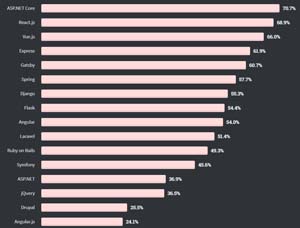 [Click on image for larger view.] Most Loved Web Frameworks (source: Stack Overflow).
[Click on image for larger view.] Most Loved Web Frameworks (source: Stack Overflow).
- .NET Core is the most loved winner in the "other frameworks, libraries and tools" category, ahead of Torch/PyTorch and Flutter.
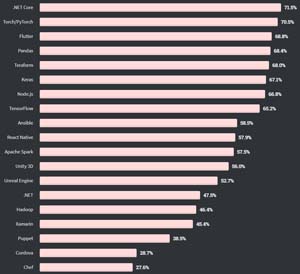 [Click on image for larger view.] Most Loved Web Other Frameworks, Libraries, and Tools (source: Stack Overflow).
[Click on image for larger view.] Most Loved Web Other Frameworks, Libraries, and Tools (source: Stack Overflow).
- .NET and .NET Core are in second and third place, respectively, in the "other frameworks, libraries and tools" popularity category, behind No. 1 Node.js.
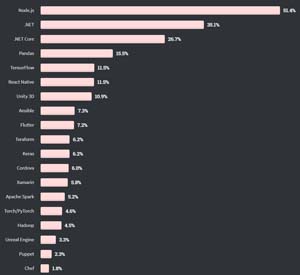 [Click on image for larger view.] Most Popular Web Other Frameworks, Libraries, and Tools (source: Stack Overflow).
[Click on image for larger view.] Most Popular Web Other Frameworks, Libraries, and Tools (source: Stack Overflow).
- GitHub, owned by Microsoft, is by far the No. 1 collaboration tool, ahead of Slack and Jira.
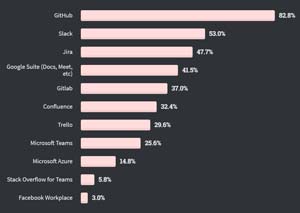 [Click on image for larger view.] Top Collaboration Tools (source: Stack Overflow).
[Click on image for larger view.] Top Collaboration Tools (source: Stack Overflow).
- Microsoft SQL Server placed third among databases, behind MySQL and PostgreSQL.
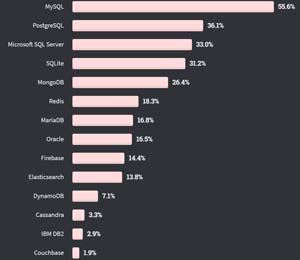 [Click on image for larger view.] Top Databases (source: Stack Overflow).
[Click on image for larger view.] Top Databases (source: Stack Overflow).
However, the survey doesn't mention Visual Studio Code, Microsoft's popular open source, cross-platform code editor, which last year was named the No. 1 tool in the "most popular developer environment" category. There was no corresponding ranking in this year's survey.
Also, on the down side of things for Microsoft, the problematic VBA (Visual Basic for Applications), was the No. 1 "most dreaded" (percent of developers who are developing with the language but have not expressed interest in continuing to do so) programming language. In the 2018 survey, Visual Basic 6 took top "honors" in that category.
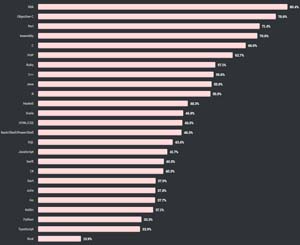 [Click on image for larger view.] Most Dreaded Languages (source: Stack Overflow).
[Click on image for larger view.] Most Dreaded Languages (source: Stack Overflow).
Other highlights of the survey as presented by Stack Overflow include:
- Unsurprisingly, for the eighth year in a row, JavaScript has maintained its stronghold as the most commonly used programming language.
- Python was No. 1 in "most wanted" category (percent of developers who are not developing with the language but have expressed interest in developing with it), followed by JavaScript and Go.
- Linux was the No. 1 platform (55 percent), followed by Windows (53.1 percent) and Docker (35 percent).
- Chef was the most dreaded other framework, library or tool, followed by Cordova and Puppet
- When focusing purely on web frameworks, the survey sees that jQuery is still king, but is slowly losing ground to React.js and Angular year over year.
- Angular.js was the most dreaded web framework, followed by Drupal and jQuery (yes, JQuery was No. 1 in popularity and No. 3 in "dreaded").
- The most loved database was Redis (ahead of PostgreSQL and Elasticsearch), the most dreaded was IBM DB2 (followed by Oracle and Couchbase) and the most wanted was MongoDB (followed by PostgreSQL and Elasticsearch).
- Site reliability engineers and DevOps specialists remain among the highest paid individual contributor roles. 80 percent of respondents believe that DevOps is at least somewhat important, and 44 percent work at organizations with at least one dedicated DevOps employee.
- 52 percent of respondents think "Hello, old friend" when they search for a coding solution online and find that the first result link is purple because they've already visited the link.
- More than 75 percent of developers work overtime at least occasionally -- one to two days per quarter. 25 percent work overtime 1-2 days per week or more.
- Australia respondents reported the highest average amount of coding experience at 16.9 years, followed by developers in United Kingdom and United States. In correlation, respondents from the United States and United Kingdom maintain the highest average age, at 33.7 and 33.1 years, respectively.
- There is still evidence that people of color are underrepresented among professional developers, but SO does see some improvement when it include all developers, not just those who code professionally.
- Many developers work on code outside of work. About 78 percent of our respondents say that they code as a hobby.
- About 55 percent of respondents identify as full-stack developers, and about 20 percent consider themselves mobile developers. The median number of developer type identifications per respondent this year is three, and the most common combinations include back-end, front-end, and full-stack developer.
- 65 percent of respondents have been coding professionally for less than 10 years.
- Of all of the respondents, over 54 percent wrote their first line of code, whether it was a web page or a hello world program, by the age of 16. People who wrote their first line of code in their 20s accounted for 13 percent of the respondents.
- Approximately 75 percent of respondents worldwide completed at least the equivalent of a bachelor's degree or higher. This is consistent with previous surveys.
- Almost 85 percent of the respondents who are professional developers feel that formal education is at least somewhat important, which is contrary to the popular idiom that you don't need formal education to become a developer.
- Among the respondents, almost 15 percent said they have some type of anxiety, mood, or emotional disorder.
The survey was conducted in February.
"The software industry has changed substantially over the last decade, but it's also true that no single technology has been quite as disruptive, at least in the short term, as the public health crisis the entire world is experiencing right now," SO said.
"The results of this survey reflect the opinions and experiences of nearly 65,000 developers. It's important to note, however, that the survey was conducted in February, before COVID-19 had been declared a global pandemic, and countries across the world had gone into lockdown. We're eager to share with the public some of the interesting statistics and changes reflected in this data, but we also understand that it's important to be humble and realistic: a lot of the answers developers gave might look very different if the same survey were conducted today."
The full gamut of survey results, broken down in many different ways, along with methodology, is available here.
About the Author
David Ramel is an editor and writer for Converge360.